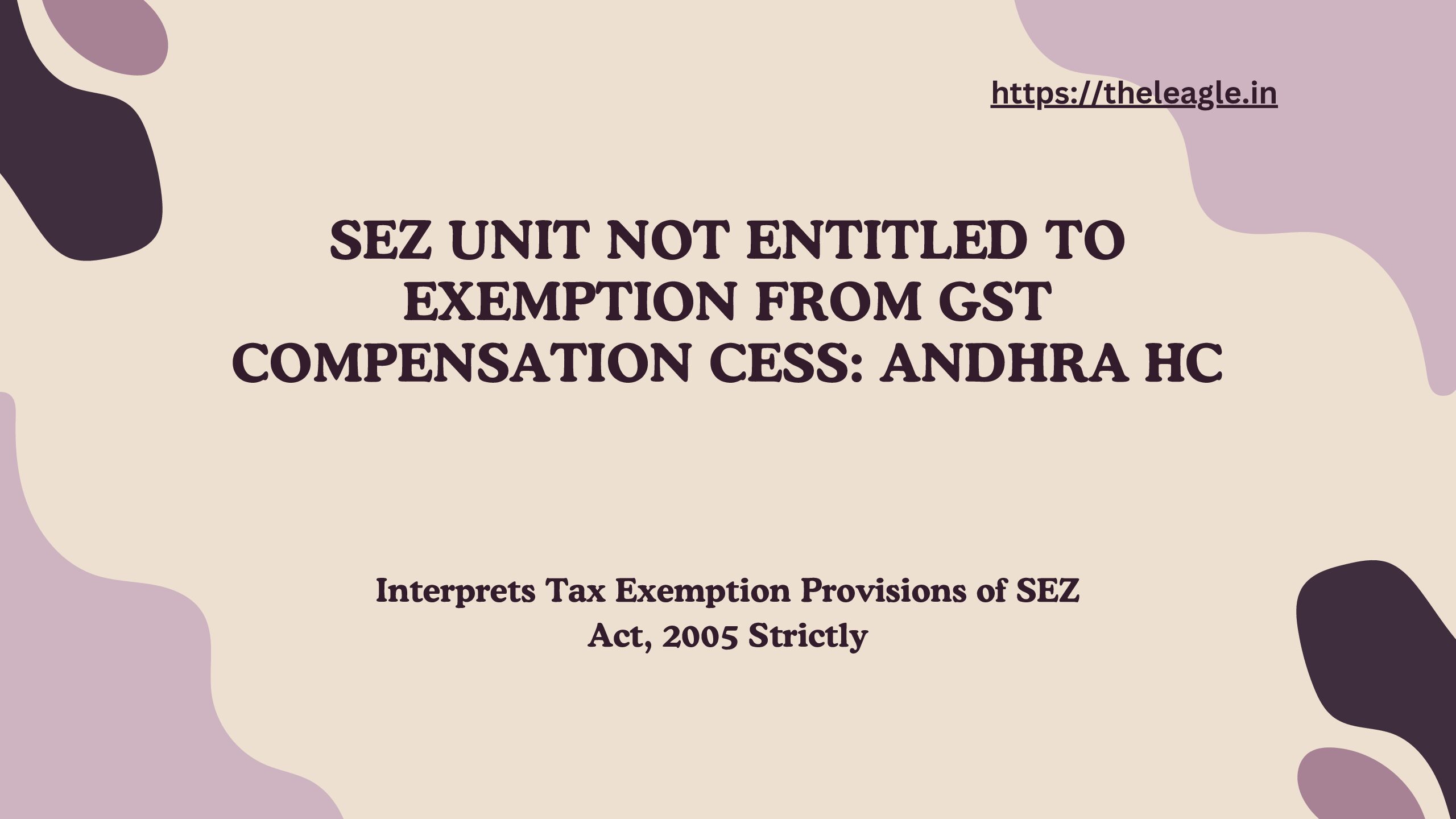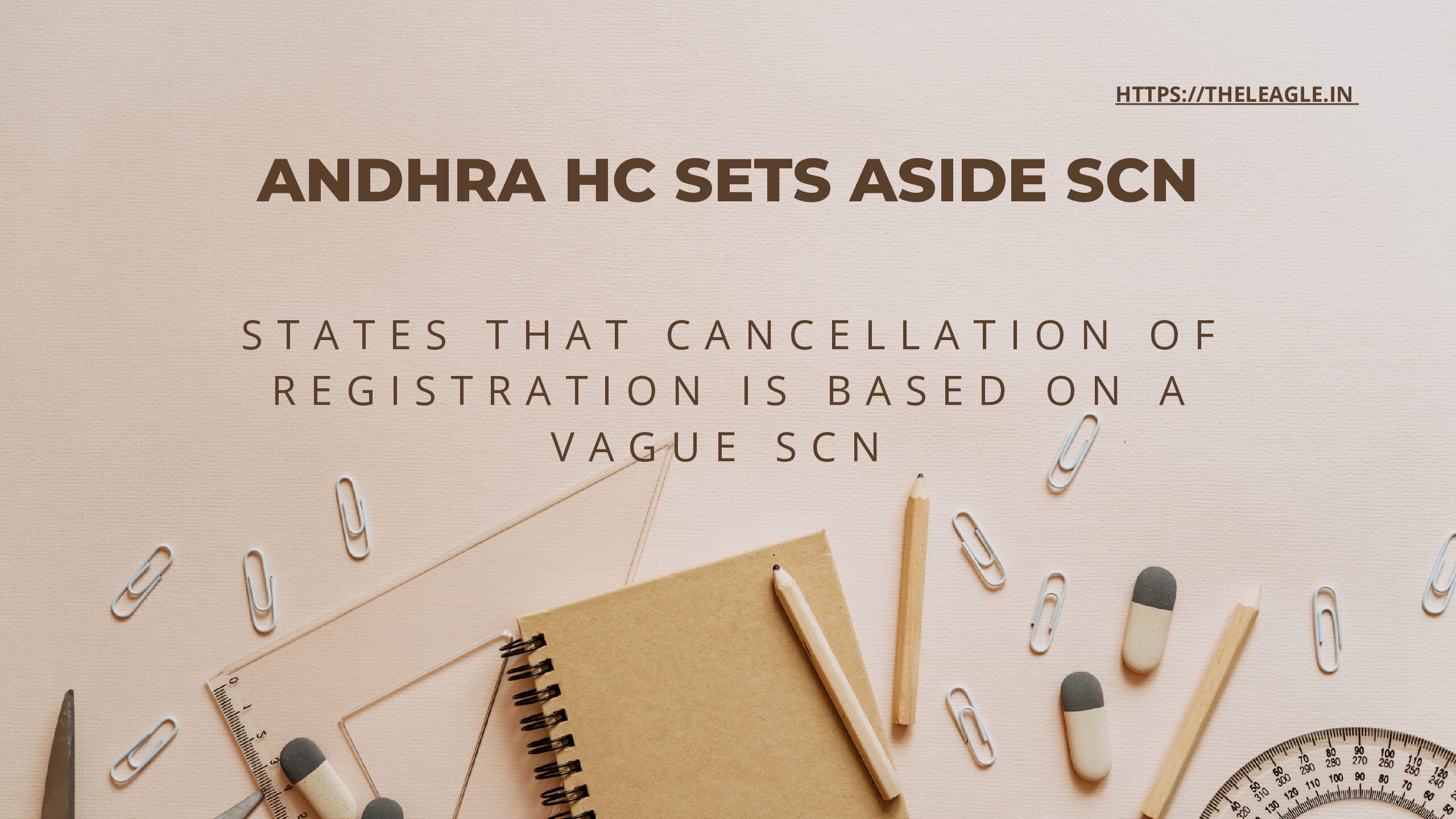In a recent decision[1], the Andhra Pradesh High Court decided two similar writ petitions and held that the SEZ unit was not eligible for exemption from GST Compensation Cess. The High Court noted that there were three specific provisions under the SEZ Act, 2005 which provided a tax exemption and interpreted the said provisions strictly to conclude that the petitioner’s claim for exemption from GST Compensation Cess did not have merit and dismissed both the writ petitions.
Facts
The petitioner was a company engaged in the business of ferro alloys manufacturing and was established as a SEZ unit under the SEZ Act, 2005. As per Section 26 of the SEZ Act, the petitioner was exempt from paying any duty, tax or cess under the Customs Act, 1962 and Customs Tariff Act, 1975. The petitioner sought clarification from Director (SEZ) if it was eligible for exemption from GST Compensation Cess on import of coal. The Director replied in the negative and stated that CBEC had issued a Notification No. 64/2017 under which payment of IGST was exempt on import of coal by a SEZ unit, which was otherwise leviable under Section 3 of the Customs Tariff Act, 1975. And under Section 26(1)(a), a SEZ unit is exempt only from duty of custom under the Customs Act, 1962 and Customs Tariff Act, 1975. Thus, there was no exemption from GST Compensation Cess under Section 26(1)(a) of SEZ Act, 2005. The petitioner challenged the aforesaid opinion of the Director (SEZ) as erroneous via writ petition before the Andhra Pradesh High Court.
The Revenue Department’s arguments before the Andhra Pradesh High Court were like that of Director (SEZ).
Decision
The Andhra Pradesh High Court spent considerable space in elaborating the nature and rationale of GST Compensation Cess, which wasn’t entirely germane to the issue in the impugned case. The High Court noted the scheme of SEZ Act and observed that tax exemption can be granted under three provisions of the SEZ Act, i.e. Sections 7, 26, and 50.
Under Section 7 the exemption from taxes and cesses is available subject to certain conditions, but only if the relevant enactments are specified in the First Schedule of the SEZ Act, 2005. The petitioners desisted the claim that they were exempt from GST Compensation Cess under Section 7, since the relevant enactment – GST (Compensation to States) Act, 2017 – was not specified in the First Schedule of the SEZ Act.
Second, petitioners did not press their claim under Section 50 since the said provision empowered the State Governments to grant tax exemptions, and there is presumably no State level legislation to implement SEZ Act, 2005.
The petitioners claim for exemption from GST Compensation Cess rested entirely on their interpretation of Section 26 of the SEZ Act. The petitioner’s argument for exemption was as follows: petitioner is exempted from custom duties under Section 26(1)(a) of SEZ Act including all the duties enumerated in the Customs Tariff Act, 1975. And since GST Compensation Cess is leviable on imports under Section 3(9) of the Customs Tariff Act, 1975, the petitioner is also exempt from paying it under Section 26(1)(a) of SEZ Act. The Revenue Department counter argued that what was exempt under Section 26(1)(a) was ‘duty of customs’ under Customs Act, 1962 or Customs Tariff Act, 1975. The Department elaborated and correctly so, that GST Compensation Cess owed its origin to the GST (Compensation to States) Act, 2017 and Section 3(9) of the Customs Tariff Act, 1975 only prescribes the rate applicable. Succinctly put, the petitioner cannot be allowed to interpret Section 26(1)(a) to include GST Compensation Cess when the provision only mentioned customs duty.
The Andhra Pradesh High Court agreed with the Revenue Department, and concluded that:
when Section 26 of SEZ Act is perused, it is discernible that the word “duty” alone is used in the said section but not the word “cess”. More prominently U/s 26(1)(a), on which much reliance is placed by the petitioners, what is exempted is only duty of customs but not any cess much-less the GST Compensation Cess. Therefore, it is difficult to accept the contention that the exemption of duty of customs under the Customs Act, 1962 or the Customs Tariff Act, 1975 or any other law on import of goods encompasses the Compensation Cess also merely because its rate of tariff is mentioned in Section 3(9) of Customs Tariff Act, 1975. In our considered view, such an argument is of no avail to the petitioners. (para 27)
In adopting a strict interpretation of Section 26(1)(a), the Andhra Pradesh High Court was clear in its conclusion that the term duty could not include within its scope GST Compensation cess. To emphasise that the scope of Section 26(1)(a) was deliberately narrow, the High Court noted that Section 7 of SEZ Act used the term ‘tax, duty or cess’, but Section 26(1)(a) did not include cess within its scope and only mentioned the term duty. And since Section 26(1)(a) only uses the term duty thereby negativing the petitioner’s argument that cess should be read into the provision.
Conclusion
The impugned decision is an appropriate example of the Court interpreting the provisions of a tax statute in a strict manner and rightly so. There is a well-established doctrine of interpreting the tax statutes in a strict manner and not read into the provision words and phrases that are not used in the relevant provision. The Andhra Pradesh High Court correctly adopted the said interpretive doctrine to deny petitioner’s claim of exemption from GST Compensation Cess.
[1] Maithan Alloys Ltd v Union of India TS-677-HCAP-GST.

